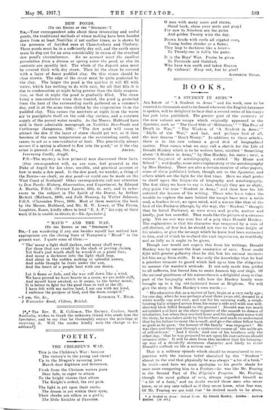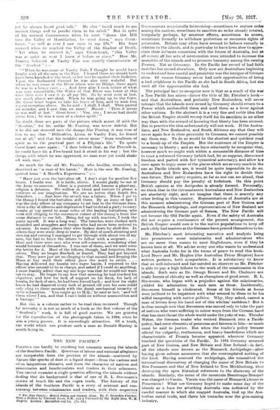B 0 0 K S.
"A STUDENT IN ARMS."
Arn lovers of "A Student in Arms" and his work, now to be counted in thousands and to be found wherever the English language is spoken, will be delighted to hoar that a second series of his essays has just been published. The greater part of the contents of
the now volume are essays which originally appeared in the Spectator, such as The Good Side of 'Militarism,'" " The Fear of Death in War," "The Wisdom of 'A Student in Arms,'" Idylls of the War," and last, and perhaps boat of all, the now famous "Don't Worry." In addition to those articles, there is in the now volume a good deal of biographical matter. First comes what we may call a sketelt for the Lifo of Donald Harikey which is to be written later, entitled "Something about 'A Student in Arms,'" by Miss Hankey, his sister ; next, a curious frazineat of autobiography, entitled '• My Home and School " ; and finally, some notes explanatory of the autobiography by Miss Hankey. There are also a certain number of other papers, some of them published before, though not, in the Spectator, and others which see the light for the first time. Hero we shall prefer to dwell upon the fragmeats of biography and autobiography. The first thing we have to say is that, though they are so slight, they paint the true Student in Arms," and show how his life enforced the lessons of his writing. Those who have taken the trouble to explore the man behind the essays have seen a noble soul, a fearle.sa heart, an open mind, and a nature like that of the best of the Puritans (though, by the way, the " Student " thought that ho hated Puritans), at once stern and gentle, austere and kindly, just but merciful. That reads like the picture of a virtuous prig. Yet no one was over less of a prig than Donald Minicoy. The explanation is that his character was tempered by a vein of self-distrust, of fear lest he should not rise to the true height of his mission, or give the message which he knew had been entrusted to him, and of which he realized the vast importance, as truthfully and as fully as it ought to be given.
Though one would not expert this from his writings, Donald Mulkey was by nature the least combative of men. None could fight with greater gallantry than he did, but his natural instincts led him away from strife. It was only the knowledge that he had a priceless treasure to guard which laid upon him the obligation to assume the warrior's attitude. It not only made him pitiful to all sufferers, but forced him to smite Ammon hip and thigh. Of the natural gentleness of his nature there is a delightful story in that part of the biography which tells how the Mulkey family wore brought up in a big old-fashioned house at Brighton. We will give the story in Miss Honkey's own words His education did, as a matter of fact, begin at a very early age ; for one day, when ho was perhaps about three years old, dressed in a white woolly cap and coat, and out for his morning walk, a neigh- bouring baby stopped across from his nurse's side and with one well- directed blow felled Donald to the ground ! Donald was too much astonished and hurt at the shoos injustice of the assault to dream of retaliation, but when they reached home and his indignant nurse told the story, he was taken aside by his brothers and made to understand that by his failure to resist the assault, and give the other fellow back as good as he gave, the honour of the family ' was impugned ! Ho was then and there put through a systematic course of ' the noble art of self-defence." And I think,' said one of his brothers only the other day, 'that lie was prepared to act upon his instructions should occasion arise.' It will be seen from this incident that his bringing- up was of a decidedly strenuous chara,ctor and likely to make Donald's outlook on life a serious one ! "
That is a military episode which should be remembered in con- junction with the curious belief cherished by the " Student " almost to the end that physically he was always " a bit of a funk." In truth—and here we must apologize to his gentle shade for once more comparing him to a Puritan—he was like Mr. Fearing in the Second Part of The Pilgrim's Progress. Mr. Fearing, though tho most gallant of mm, always regarded himself as "a bit of a funk," and no doubt envied those men who never knew, or at any rate talked as if they never knew, what fear was. Of Mr. Fearing we are told that "he desired much to be alone, • A Student in Arms: Second Series. By Donald Ilankey. London : Andrea, Melrose. Pa. pet.] -
yet ho always loved good talk." He also "loved much to soo ancient thing's and to ponder them in his mind." But in spite of his natural timorousness when ho wont "down the Hill into the Valley of Humiliation, he went down," says Groat- heart, "as well as over I saw man in my life." His fears revived when he reeehed the Valley of the Shadow of Death. " Yet whoa he mitered it," says Great-heart, "this Valley was as quiet as ever I knew it before or since." How Mr. Fearing behaved at Vanity Fair was exactly characteristic of the " student. "
" When he was come at Vanity Fair, I thought he would have fought with all the men in the Fair. I feared there we should both have lmen knocked o' the head, so hot was he against their fooleries. Upon the Inchanted -Ground he was also very wakeful. But when he was come at the River where was no Bridge, there again Ito was in a heavy case. . . And hero also I took notice of what was very remarkable, 'the Water of that River was lower at this One than over I saw it in all my life. So he went over at last, not much above wet-shod. When ho was going up to the Gate, Mr. Great-heart began to take his leave of him, and to wish him a good reception above. So he said : I shall, I shall. Then parted we asunder, and I saw him no more.' Honest: Then it seems he was well at. last.' Greet .earl : Yes, yes ; I never had doubt about him ; he was a man of a choice spirit.' "
No doubt there are parts of the picture which assort ill with the "Student," for he, unlike Mr. Fearing, was never doleful. But if he did not descend into the dtunps like Fearing, it was true of him to say that "Difficulties, Lions, or Vanity Fair, ho feared not at all," and that his troubles never arose "from weakness of spirit as to the practical part of a Pilgrim's life." To quote Great-heart once again : "I dare believe that, as the Proverb is, he could have bit a Fire-brand had it stead in his way ; but the things with which he was oppressed, no man ever yet could shako off with ease."
So much for the old Mr. Fearing, who besides, remember, is descrilied.as "a man Of his hands." Hero is the new Mr. Fearing, quoted from "A Month's Experiences" :—
"Have just seen the battalion off. I don't start for another five hours. I loathe war. It is futile, idiotic. I would gladly be out of the Army to-morrow. Glory is a painted idol, honour a phantasy, religion a delusion. We wallow in blood and torture to please a creature of our imagination. We are no better than South Sea Islanders. . . Just hero the attack was a failure. When I got to the Dump I found the battalion still there. By an irony of fate I was the only officer of my company to set foot in the German linos. After a day of idleness and depression I had to detail a party to carry bombs at top speed to some relies of the leading battalions, who were still clinging to the extremost corner of the enemy's front line some distance to our left. Being fed up with inaction, I took tho party myself. It was a long way. The trenches were choked with 'wounded and stragglers iind troops who had never been ordered to advance. In many places they were broken down by shell-fire. In others they wore waist-deep in water. By dint of much shouting and shoving and cursing I managed to get through with about ten of my men, but had to leave the others to follow with a sergeant. . . . Here and there were men who were self-conscious, wondering what would become of-themselves. I was one of themsend -we wore none the better for it. Most of the fellows, though, had forgotten them- selves. They no longer flinched, -or feared. They had got beyond that. They were just set on clinging to that mound and keeping the Huns at bay until -their officer gave the word to retire. . . . Having delivered my bombs into eager hands, I reported to the officer who seemed 'to be in charge, and asked if I could do anything. I must frankly admit that my one hope was that he would not want me to stay. He began to say how that morning he had reached his objective, and how for lack of support on his flank, for lack of bombs, for lack of men, he had been forced back and how for eight hours he had disputed every inch of ground till now his men could only cling to these mounds with the dumb mechanical tenacity of utter exhaustion. 'You might go to H.Q.,' he 'saidat last, 'and tell them where I am, and that I can't hold on without ammunition and a barrage.' "
But this is a volume rather to be read than reviewed Though by necessity it is not so much of a book as the first volume of the " Student's " work, it is full of good matter. We are grateful for the reproduction of the photograph taken in 1904, when he arias a young gunner. It is exceedingly attractive. Of a truth, the world which van produce such a man as Donald Mulkey is worth living in.



























 Previous page
Previous page